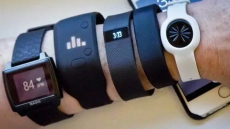Heart researchers say there's a surprising reason Canada has seen higher COVID-19 deaths than many countries with fewer health-care resources — more Canadians live longer with chronic disease, putting them at greater risk of dying from COVID-19.
Research led by Heart & Stroke also found the pandemic has likely postponed thousands of cardiovascular procedures.
Lead author Cindy Yip said the findings underscore the devastating consequences of poor heart health, even if excellent medical care and technology is available.
"Quality of care is good to have, but it's not enough," said Yip, principal investigator and director of data knowledge management at Heart & Stroke, formerly known as the Heart and Stroke Foundation.
She said Canadians are somewhat vulnerable to pandemics such as COVID-19 because so many have survived other health crises.
"Because people are living longer with chronic disease like heart conditions and stroke we need to take actions, and we need them to take care of their health in order to avoid the poor outcome from COVID-19."
The study notes 11.7 per cent of Canadians suffer from cardiovascular disease, including strokes. That puts us in the top third among 63 countries studied — worse than the 11.6 per cent found in the United States, 10 per cent in Russia, 7.6 per cent in South Korea, 4.3 per cent in India and 3.8 per cent in Pakistan.
When it came to reported death rates from COVID-19, Canada ranked higher than all but 14 of the 65 countries studied (two additional countries had sufficient data). That included places with poorer health-care resources such as Russia, India, Pakistan, and China.
The study looked at COVID-19 cases reported between Jan. 21 and April 30, when Canada listed 54,457 confirmed cases and a case fatality rate of 6.1 per cent.
Lower foreign death rates included 1 per cent in Russia, 5.5 per cent in China and 3.3 per cent in India.
Yip acknowledged that countries vary in how they report deaths, but said researchers strove to use comparable numbers.
She said the analysis accounted for the wide range in access to health-care services among countries. But a strong relationship between COVID-19 deaths and the prevalence of heart conditions and stroke was still there.
For every 1 per cent increase in the number of people with heart problems, the COVID-19 death rate was 19 per cent higher.
Age was also a factor.
For every 1 per cent increase in the number of people aged 65 years and older, the COVID-19 death rate was 9 per cent higher. Nearly 9 per cent of the Canadian population is 65 or older.
The study also tried to number the heart-related medical procedures that have been postponed by the pandemic, but Yip said data here is limited, forcing researchers to extrapolate.
She noted data provided by 20 cardiac centres in Ontario indicate fewer heart procedures were performed between March 16 and May 3 and the same period last year: 42 per cent fewer bypass surgeries, 37 per cent fewer angioplasty procedures and 45 per cent fewer valve surgeries.
The report estimates that province-wide, 1,252 procedures are being postponed each month by COVID-19 precautions.
Yip said that could easily translate to thousands of patients across the country. And that means health-care providers need "a very strategic plan" to provide care for people whose conditions may be worsening.
Yip said the study lends increased force to public health directives to socially distance and wash hands often.
But she said it also underscores the need for heart-healthy habits — regular exercise, healthy eating and no smoking or vaping.
"Take care of your heart and brain health because if you don't have good heart and brain health, if you get COVID-19 your outcome is not good."






